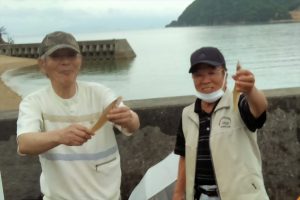【R-BBL】3rd Bubble Club, Making fish mint soap 第3回バブルクラブ, ドクダミ&ヤギミルクせっけんづくり
Wed June 17, 2020
Today's local ingredient for soap making was fish mint*, Dokudami in Japanese. Keiko san and Kazumi san harvested it in the front yard and brought frozen Dokudami extract, conc. Dokudami tea. They served Dokudami tea. Contrary to my expectations, it was easy to drink. We combined it with goat milk for use.
Keiko san and Kazumi san brought the flowers, too. They gave me some of them, and told me that they made medicine for insect bites out of it. According to their instruction, I washed the flowers, wiped with paper towel and soaked them in white liquor. Keiko san put the flower on top of soap carefully. It was cute. The color of the flower turned into brown a few days later, and it is also cute.
We tried to remove a mold of soaps we made last week and two weeks ago. But soaps made last week were still soft, so we stopped to remove a mold. The soap made two weeks ago was hard enough to cut. The design is good. We have to wait two more weeks for use.
Wed June 17, 2020
今日の石鹸づくりに使う地元材料は、「どくだみ*」です。英語では「fish mint(魚のミント)」というようで、臭いを意識した名前のようです。ヤギミルクと組み合わせて用いました。
けいこさんとかずみさんが、自宅の前庭で収穫し、濃厚なドクダミ茶にして凍結した状態で持ってきてくれました。 ドクダミ茶も用意してくれていました。予想に反して、のみやすかったです。
けいこさんとかずみさんは、ドクダミの花も持ってきました。虫刺されの薬を作ったとのこと。私にも分けてくれたので、教えてもらった手順に従って、花を洗い、ペーパータオルで水分を取り、瓶に入れてホワイトリカーを注ぎました。
けいこさんは石鹸のトップに花をきれいに並べていました。とてもかわいい石鹸になりました。2,3日たつと花は茶色に変色していましたが、これもいい。
先週、2週間前に作った石鹸を型から出そうとしましたが、まだ柔らかいものがあったので途中までにしました。2週間前に作った石鹸は、切り分けられる硬さになっていました。表面のマーブルが美しいです。使えるようになるまであと2週間。待ち遠しいです。
*どくだみの医薬用途について:
こちらの日本版wikipediaに詳しいです(英語版Wikipediaは薬用の記載が浅かったので、日本語版をgoogle翻訳を掲載)
About fish mint:
Following is English translation from Japanese Wikipedia at a part of medical use.
--
Dokudami is used as an internal medicine for gastrointestinal diseases, meals, diarrhea, constipation, diuresis, etc., and is also used as an external medicine for draining and poisoning swelling, pimples, skin diseases, etc.
As a herbal medicine, the above-ground stems and leaves at the flowering stage are dried in the shade and are distributed in Japan, which is called “Ten-yaku” and is also recorded in the Japanese Pharmacopoeia. Fresh leaves are also used as external herbs. The decoction of the ten drugs has a diuretic effect, laxative effect, hypertension, and preventive effect on arteriosclerosis. Especially, to prevent hypertension and arteriosclerosis, be sure to select and collect flowers.
In the private sector, it is known that 5 to 20 grams of dried whole plants with flowers are decocted in a simmering heat with 500 to 600 cc of water until half the amount is taken, and the tea is taken in three divided doses. By exposing the foliage to the sun, the characteristic odor disappears. It is a herb that takes extra heat from the affected area. It is said to be good for hemorrhoids with constipation and a feeling of heat, swelling and dry swelling and red swelling, and pyometra with yellow nasal discharge. However, it is contraindicated for pregnant women. For eczema, rashes, acne, athlete's foot, and black spiders, it is advisable to attach a mashed fresh leaf, and insert fresh leaf juice for empyema, chronic rhinitis, and vaginitis. For hot weather, put it in a cloth bag and use it as a bath water charge.
It is used as an antidote in Kampo and is prescribed to Gyoseisou Kyoto, Gotoge Dekusan. However, Dokudami (fish-fed grass, ten herbs) is often used alone, it is not often used as a herbal medicine with other crude drugs.
The peculiar odor of raw aerial foliage is a component called decanoylacetaldehyde, which has a bacteriostatic effect [3]. Flowers contain isoquercetin, and foliage contains quercetin and potassium salts [3].
Decanoylacetaldehyde-An odor component characteristic of raw Dodami, Phytoncide. Has antibacterial and antifungal properties. It also acts to kill ringworm and staphylococcus [18]. When dried, it is oxidized and loses its antibacterial effect.
Lauryl aldehyde-a odor component peculiar to Dokudami like decanoylacetaldehyde, with an antibacterial effect.
Quercitrin-diuretic effect, arteriosclerosis prevention effect
Quercetin-action to strengthen the capillaries, diuretic action [3].
Potassium salt-diuretic effect, prevention of arteriosclerosis
Side effects of drinking Dokudami tea have been reported.
Hyperkalemia [19] Increased liver function test values (GOT, GPT) have been reported [20] --



